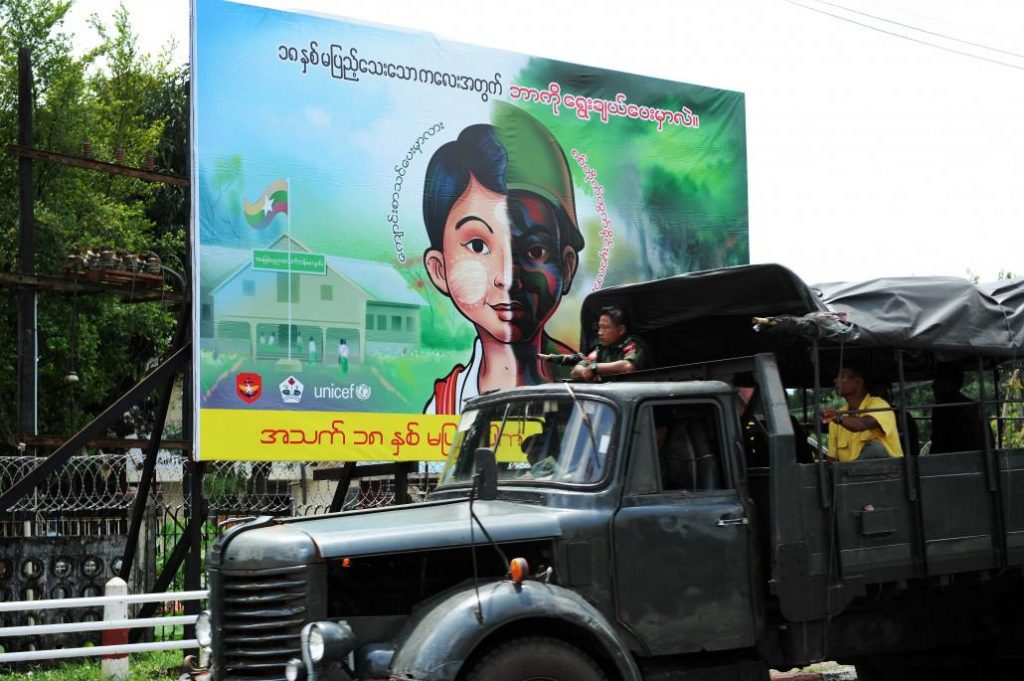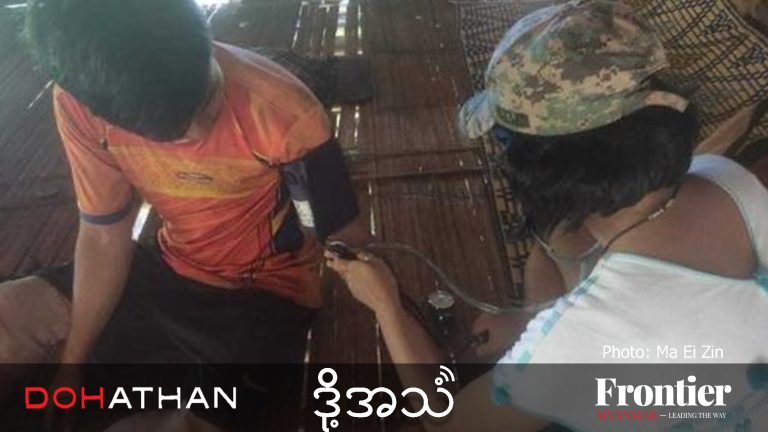The Tatmadaw’s continued use of children in non-combat roles is holding the country back and it needs to take stronger action to protect children from exposure to conflict.
By GEORGE N SIBLEY | FRONTIER
During my three years in Myanmar at the United States embassy, I have been privileged to meet people who inspire me with their dedication to making their communities better. While Myanmar faces many challenges, I have been encouraged by efforts in one specific area: the continued focus of the Myanmar government to combat the heinous crime of trafficking in persons.
Over the past year, Myanmar enacted the Child Rights Law, ratified the Child Soldier Treaty, increased the prosecution of traffickers, and improved support for victims of human trafficking. All of these are significant steps as Myanmar works to protect victims and prevent the exploitation of its people.
Challenges, of course, remain, just as they do in my country and in many others. In Myanmar, poverty, conflict and porous borders facilitate the trafficking of young women for forced marriages in China and Malaysia; illegal and unregulated fishing puts men and women at risk of labor exploitation; and seemingly high-paying foreign jobs lure people searching for a better future into exploitation.
All parts of the Myanmar government must continue to make progress to proactively prevent human trafficking, investigate and prosecute perpetrators, and protect the victims, who are often the most vulnerable in society.
We will continue to partner with Myanmar to combat human trafficking. For example, we support the development of the Myanmar justice sector to investigate and prosecute trafficking in persons crimes. Last December, the US helped to bring together law officers from around the country to discuss how to better coordinate anti-trafficking efforts.
The Union Attorney General’s Office then established a network of 74 trafficking coordinators, one in each of its district offices, to enhance and track prosecution of human trafficking crimes. The US embassy also coordinates training with police officers throughout Myanmar, bringing the expertise of US federal and local police officers to hone the skills of Myanmar police officers in identifying trafficking victims and conducting victim-centric investigations.
The US also collectively provides more than US$1 million annually to civil society organisations and government agencies, such as the Department of Rehabilitation, to prevent human trafficking, and to both protect and support victims.
There are two main concrete actions Myanmar can take this year. First, we welcome ongoing government efforts to amend the 2005 Anti-Trafficking in Persons Law to comply with the United Nations Convention Against Transnational Organized Crime (also known as the Palermo Convention). We hope Myanmar enacts this important legislation this year and joins other ASEAN countries in protecting the most vulnerable victims by removing any requirements to demonstrate force or coercion when prosecuting allegations of child trafficking. Current and future generations of Myanmar youth deserve this protection.
Second, ending child soldiering is a key part of the equation. The Myanmar military has taken several important steps to end this practice. These include centralising recruitment to ensure that recruits are at least 18 years old and instituting a “benefit of the doubt” policy to demobilise suspected underage recruits. These measures have made a valuable contribution to the Myanmar military’s efforts to remove children from its ranks.
Similar efforts to end the use of children in combat among ethnic armed groups continue, and we hope that in partnership with the United Nations this practice will end throughout Myanmar. This June, the UN took note of these positive measures and, through the Secretary General’s Annual Report on Children in Armed Conflict, delisted the Myanmar military as an entity that recruits child soldiers for combat roles.
For the military to remain off the UN list, it has to follow through on promises it has made to eliminate over the next 12 months the forced labor of children in non-combat roles by members of the military.
The use of any civilians, especially children, by the military for non-combat roles requires urgent attention. The presence of minors in any capacity in or around military encampments creates a serious danger that children could be accidentally injured or killed in conflict.
Yet it remains all too common for military field commanders to enlist local populations, including children, to serve as porters, guides, cooks, maintenance staff, or to engage in agricultural work. As the UN noted in its June report, there was an alarming number of verified cases – 197 in all – of the use of children by the military in 2019, mostly in Rakhine State.
The Myanmar military’s continued use of children in non-combatant roles was a central reason that the country, despite making some progress, remains on Tier 3 in the US State Department’s annual Trafficking in Persons report this year. While the decision to use children in non-combat roles may have been made at lower command levels, these cases undermine efforts to bring peace and damage the international reputation of the Myanmar military. Put simply, children under the age of 18 have no place in a professional military.
I am optimistic that Myanmar can resolve this issue in the next six months. Myanmar’s recently enacted Child Rights Law already forbids the use of children in armed conflict, including for forced labour, and implementing regulations are needed urgently. The Myanmar military has likewise made it clear in the past through a series of orders in 2012 that the use of children in non-combat roles is prohibited.
It is therefore time for the Myanmar military to end unequivocally the involvement of children in any aspect of military work. Military leaders must restate publicly and expand directives ending the practice and provide the necessary training to ensure that these directives are understood and followed by officers and enlisted soldiers alike. Military leaders should also ensure commensurate punishment for any member who ignores those directives. Transparent enforcement must accompany this effort.
The military has an obligation to protect all civilians – and especially children – from the ravages of armed conflict and end its use of children entirely. If it can achieve that, Myanmar will be stronger for it.
George N Sibley is the chargé d’affaires at the United States embassy in Yangon.







